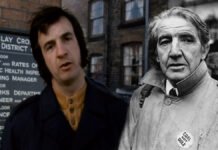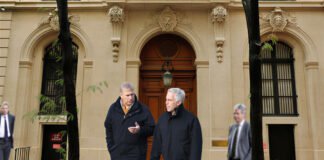Malta: police detained one of the country’s most prominent businessmen on Wednesday in connection with an investigation into the murder of journalist Daphne Caruana Galizia.
The yacht of Yorgen Fenech, a leading hotelier and director of the Maltese power company, was intercepted on a course out of the country and forced back to port.
Malaise officials have not yet released details on whether Fenech faces any charges, but authorities would have 48 hours to decide on them.
Fenech’s name was on leaked documents as a source of income for companies named in the Panama Papers, a financial scandal Caruana Galizia was investigating before her death. She alleged that Maltese politicians were linked to companies named in the papers.
Fenech’s luxury yacht Gio left the Portomaso yacht marina, five miles (eight kilometres) north of Valletta, shortly before dawn. Police swiftly boarded the vessel and forced it to return to port.
The arrest was carried out on during a Europol-backed operation into money laundering, the statement from the Prime Minister’s Office confirmed.
Investigators are following an alleged money trail between the suspected middleman and three men accused of killing the 53-year-old journalist, The Times of Malta reported.
The suspected middleman is understood to have been identified by one of the alleged hitmen.
His arrest came the day after the government said it would offer a pardon to a suspected middleman in the 2017 murder of Caruana Galizia if he named the mastermind behind the killing.
The middleman is believed to have linked the person suspected of commissioning her murder, to the men accused of carrying out the killing, as well as those who helped procure the explosive device used in the operation.
The Prime Minister’s Office said that the man “showed willingness, after some time of interrogation by the police, to collaborate” but that he “asked to be granted a presidential pardon first” for all the cases he might have been involved in.
The island’s leader added that after some negotiations with the man’s lawyers, he drafted and signed a letter giving the suspect assurances that if he “gave all the information and evidence that he had, and if all this could be corroborated in court, I would recommend that this person be given a presidential pardon.”
The men, who include two brothers, were charged with triggering the car bomb in December 2017. The trial is yet to take place.
The government’s decision regarding a presidential pardon is believed to have been discussed at a Cabinet meeting on Tuesday where some ministers were said to be reluctant to grant it.
Muscat justified the decision in his statement, saying that “the government did what it had to do.”
“As I said from the start, I will leave no stone unturned in this case. There is no question of impunity for whoever is responsible for this crime,” he added.
The developments follow strong criticism of the police investigation by a senior European monitor last month.
Speaking on the second anniversary of Caruana Galizia’s death, Pieter Omtzigt, a special rapporteur for the Council of Europe, listed a catalogue of alleged failings and said he was concerned the authorities may have turned down evidence that could lead to those who commissioned the killing.
He pointed to a failure to agree a deal with one of the alleged hitmen, Vince Muscat, or act on his information, as a concern, saying the police may have turned down “vital evidence”.
The case has shocked Europe, and led to questions about the rule of law on Malta. It has also thrown Malta’s ruling Labour party into turmoil. Among Caruana Galizia’s most important investigations was the revelation that two current members of Muscat’s Labour government had acquired secretive Panama-registered companies soon after taking office.
In September a public inquiry was ordered into Daphne Caruana Galizia’s murder, in response to recommendations made in a report by the Council of Europe – a non-EU human rights body with 47 member states. It said the failure of the Maltese authorities to bring perpetrators to trial raised serious questions about the rule of law on the island.
The independence of the inquiry has been questioned by the murdered journalist’s sons
Who was Daphne Caruana Galizia
The best way to describe Daphne Caruana Galizia, was a blogger whose investigations focused on corruption a one-woman WikiLeaks, crusading against untransparency and corruption in Malta, an island nation famous for both.
To the corrupt like John Dalli, a former EU commissioner whom she helped bring down in a tobacco lobbying scandal, Galizia was “a terrorist.” To opposition MPs, she’s was a political force of nature, one who fortunately had her guns aimed at the other side of the aisle. “She single-handedly brought the government to the verge of collapse,” says one MP. “The lady has balls,” says another.
Galizia was one of the journalist who led the Panama Papers investigation into corruption in Malta and mainland EU countries. There have been many conspiracies behind the motives that brought about the assassination of Daphne Caruana Galizia who was killed in a car bomb near her home village of Bidnija on the Island of Malta in October 2017.
Daphne Caruana Galizia was an investigative reporter, a towering, intense mother of three, digging up dirt on the most powerful figures in Malta, the European Union’s smallest member state.
Thousands read her blog, Running Commentary, in this golden-walled island nation of fewer than half a million people, located between Libya and Italy.
On Oct. 16, 2017, a warm, heavy day in Bidnija, the northern village where she lived with her lawyer husband in their garden-encircled home, she typed her blog’s final words: “There are crooks everywhere you look now. The situation is desperate.”
“They wanted to shut her up”
After Galizia of assassination it was reported, dozens of journalists are killed every year around the world in war zones or countries with weak rule of law like Russia. The European Union, a free-speech haven that’s a refuge for journalists attacked in their own countries, was shocked that such a brazen murder could happen in their club.
Since 2017 we have seen a number of journalist murdered within the borders of the EU this supposed refuge of free-speech all with one thing in common, their dogged investigations into corruption.
Third Journalist in a year murdered while investigating EU Corruption.
The right of a journalist to investigate, ask uncomfortable questions and report effectively is at the heart of a free society and must be guaranteed at all times.
Caruana Galicia asked uncomfortable questions about alleged fuel smuggling, organized crime and the sale of Maltese passports, which allow free movement through the EU.
She dug into money laundering and fraud allegations at Pilatus Bank, run by Ali Sadr Hasheminejad, who is facing criminal prosecution in the United States. She combed through the leaked law firm records known as the Panama Papers and found offshore wealth tied to the Maltese prime minister’s inner circle.
“They wanted to shut her up,” says her 52-year-old sister Corinne Vella. “She obviously spoke truth to power. That was threatening to people in power.”
Daphne Caruana Galizia died when her car, a Peugeot 108, was destroyed by a powerful explosive device which blew the vehicle into several pieces and threw the debris into a nearby field.

Caruana Galizia’s supporters believe she was trying to root out that rot. They don’t want her to be forgotten.
On the 16th of every month, they mark the day of her murder with a vigil outside the courthouse in Malta’s capital Valletta.
Support Independent Journalism Today
Our unwavering dedication is to provide you with unbiased news, diverse perspectives, and insightful opinions. We're on a mission to ensure that those in positions of power are held accountable for their actions, but we can't do it alone. Labour Heartlands is primarily funded by me, Paul Knaggs, and by the generous contributions of readers like you. Your donations keep us going and help us uphold the principles of independent journalism. Join us in our quest for truth, transparency, and accountability – donate today and be a part of our mission!
Like everyone else, we're facing challenges, and we need your help to stay online and continue providing crucial journalism. Every contribution, no matter how small, goes a long way in helping us thrive. By becoming one of our donors, you become a vital part of our mission to uncover the truth and uphold the values of democracy.
While we maintain our independence from political affiliations, we stand united against corruption, injustice, and the erosion of free speech, truth, and democracy. We believe in the power of accurate information in a democracy, and we consider facts non-negotiable.
Your support, no matter the amount, can make a significant impact. Together, we can make a difference and continue our journey toward a more informed and just society.
Thank you for supporting Labour Heartlands












